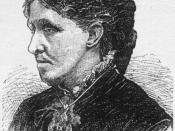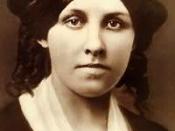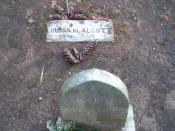Born in 1832 to Bronson and Abba Alcott, Louisa May Alcott constantly struggled with the anger and individualistic, unladylike spirit that came naturally to her. Since Louisa, like her mother, was born dark-haired and "willful," her father viewed her as a challenge, sometimes going so far as to call her the "Possessed One" "pathetic," and "bound in chains . . . which she could not break"(Stern, Biography, p. 78). He thought that teaching Louisa to suppress her natural inclinations for self-expression and difference in favor of what he perceived as feminine habits was part of his job in life, and Louisa seemed to see her life as one of struggle between her own will and submission to her father's. Bronson's belief in Louisa's demonic nature, and the doubts and pain that belief caused Louisa, can be found in her writings. By writing about female characters that were expected to live up to the same expectations placed on her by Bronson, Alcott expressed her hatred of the female "ideal."
In this paper I have analyzed Alcott's view of woman in three of her acclaimed works: Little Women, "A Whisperer in the Dark," and Behind A Mask.
Due to strong Protestant influences, nineteenth century American life stressed the importance of hard work, social propriety, and religious piety. With these social norms came rigid views of gender roles. Women especially were limited as to what their status was in this society (Stern, Biography, p. 76). Louisa May Alcott's novel, Little Women, tries to illustrate a favorable portrait of the upstanding lives that four young girls and their mother lead in their allotted roles in this patriarchal culture. The book becomes almost an instructional of how young ladies should act in order to gain respect, find husbands, and then experience happiness. In...



Wow
not much i can say. WOW. Really, GOOD JOB
you obviously worked very hard on this, and WOW
2 out of 2 people found this comment useful.